Upcoming Features of AI in 2025
As we move into 2025, Artificial Intelligence continues to revolutionize industries and reshape the way we live and work. Here are some of the most anticipated advancements:
- Hyper-Personalization: AI algorithms will refine user experiences, offering tailored recommendations in e-commerce, entertainment, and education at unprecedented levels.
- Autonomous Systems: Self-driving vehicles, drones, and automated manufacturing systems will become more reliable and widely adopted, enhancing logistics and production.
- Generative AI for Creativity: Enhanced tools for art, music, content creation, and coding will empower creators, with AI acting as both collaborator and innovator.
- AI in Healthcare: Breakthroughs in predictive diagnostics, personalized medicine, and robotic surgeries will transform patient care and outcomes.
- Sustainable AI: Green AI initiatives will focus on reducing energy consumption in data centers and creating more efficient algorithms.
- AI-Driven Education: Intelligent tutors and adaptive learning platforms will make education more accessible and tailored to individual needs.
Challenges Facing AI in 2025
While AI holds immense promise, it also poses significant challenges:
- Ethical Concerns: Issues around data privacy, surveillance, and the misuse of AI remain critical.
- Bias and Fairness: Ensuring AI systems are free from biases that could lead to discrimination or unfair outcomes is an ongoing struggle.
- Regulation: Balancing innovation with regulatory oversight is challenging, as laws often lag behind technological advancements.
- Cybersecurity Risks: As AI systems become more sophisticated, so do the methods of cyberattacks targeting these systems.
- Skill Gaps: The workforce needs to adapt to an AI-driven economy, but reskilling at scale remains a hurdle.
Drawbacks of AI Implementation
- Job Displacement: Automation and AI may lead to significant job losses in industries like manufacturing, logistics, and customer service.
- High Costs: Developing and deploying advanced AI systems require substantial investments, limiting accessibility for smaller organizations.
- Overdependence: Excessive reliance on AI could lead to diminished critical thinking and problem-solving skills among humans.
- Environmental Impact: Despite green initiatives, training large AI models still consumes considerable energy, contributing to carbon emissions.
Effects on the Human Brain
AI’s pervasive presence is reshaping human cognition and behavior:
- Enhanced Learning: AI-powered tools can improve memory and learning capabilities by offering personalized content.
- Reduced Attention Spans: Constant interaction with AI-driven platforms like social media can fragment focus and reduce deep thinking.
- Dependency: Overreliance on AI for decision-making may weaken our ability to analyze and solve problems independently.
- Cognitive Augmentation: AI technologies like brain-computer interfaces may enhance brain functions, opening possibilities for expanded human potential.
Analysis and Logic
AI’s evolution underscores the interplay of logic, data, and human creativity. By leveraging vast datasets and intricate algorithms, AI can:
- Identify patterns and insights that were previously inaccessible.
- Simulate complex decision-making processes with remarkable precision.
- Accelerate problem-solving in areas like climate modeling and disease control.
However, the ethical frameworks and logical constraints we impose will determine AI’s trajectory and alignment with human values.
Economic Impacts
AI’s economic influence in 2025 will be profound:
- Boosting Productivity: AI will drive efficiency in industries ranging from agriculture to aerospace.
- Market Disruption: Traditional businesses may struggle to compete with AI-driven competitors, leading to market realignments.
- Job Creation: While some jobs will be lost, new roles in AI development, maintenance, and ethics will emerge.
- Global Inequality: Uneven access to AI technology could exacerbate economic disparities between countries and regions.
Conclusion
The journey of AI in 2025 will be marked by incredible achievements and formidable challenges. Its integration into society demands thoughtful analysis, ethical vigilance, and proactive measures to ensure that its benefits are maximized while minimizing potential harms. As we stand on the brink of this transformative era, the decisions we make today will shape the role of AI for generations to come.
References
- “The Future of AI: Trends and Predictions for 2025” – Journal of Artificial Intelligence Research, 2024.
- “AI and Ethics: Challenges in the Age of Automation” – Ethics in Technology Review, 2023.
- “Economic Impacts of Artificial Intelligence” – World Economic Forum Report, 2024.
- “AI and Human Cognition: A Dual-Edged Sword” – Cognitive Science Quarterly, 2024.
- “Green AI Initiatives for a Sustainable Future” – Sustainable Tech Magazine, 2024.

Leave a Reply